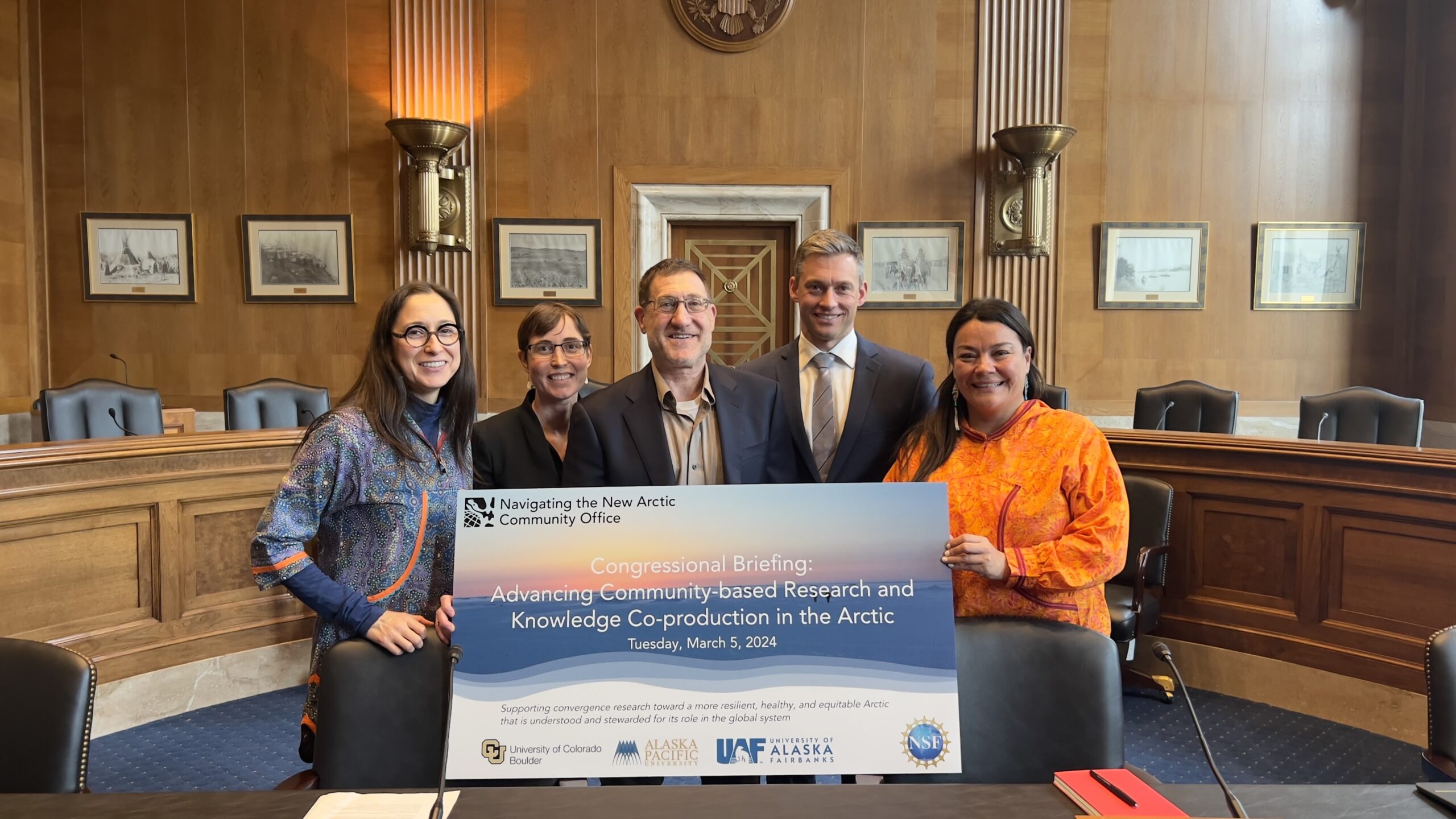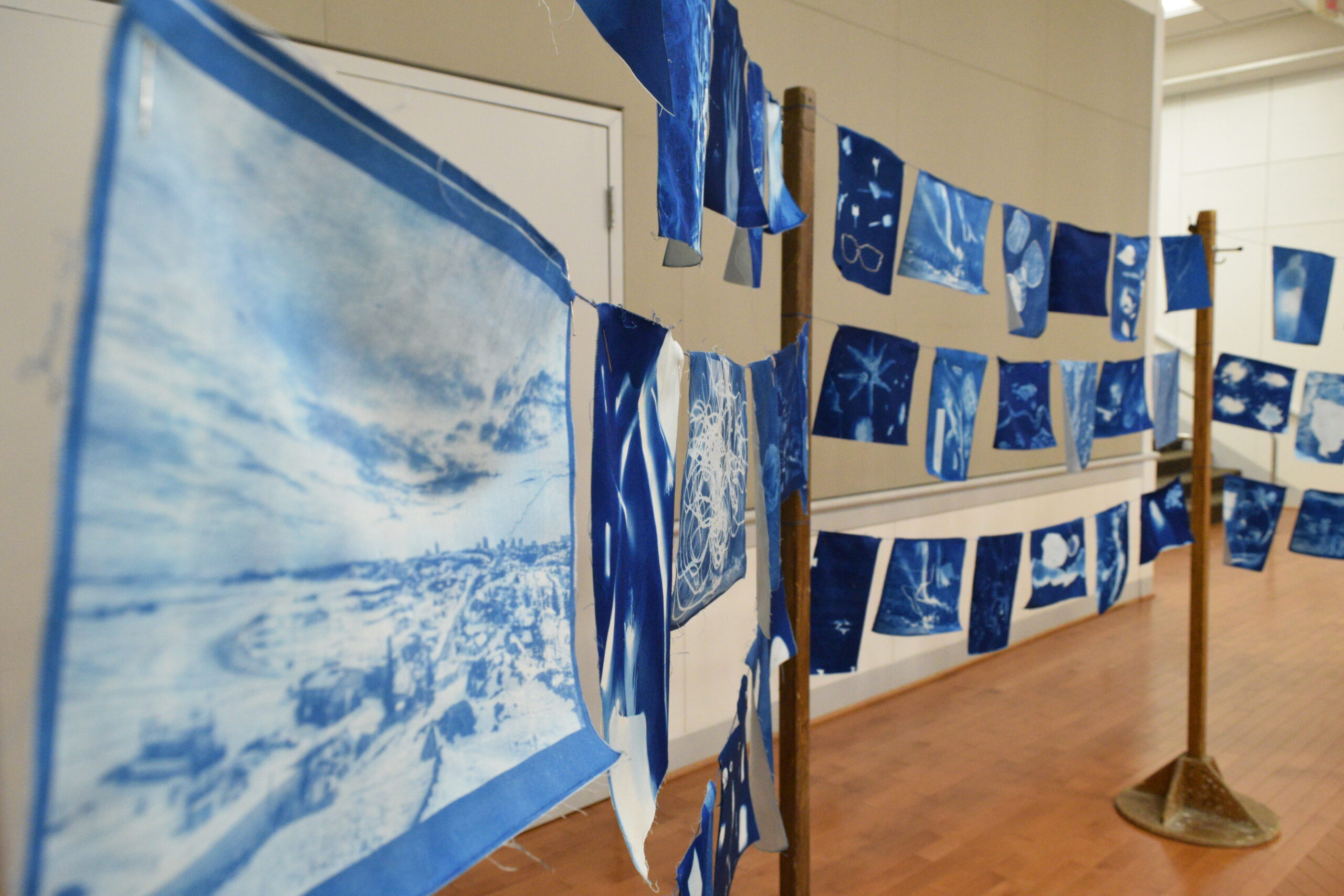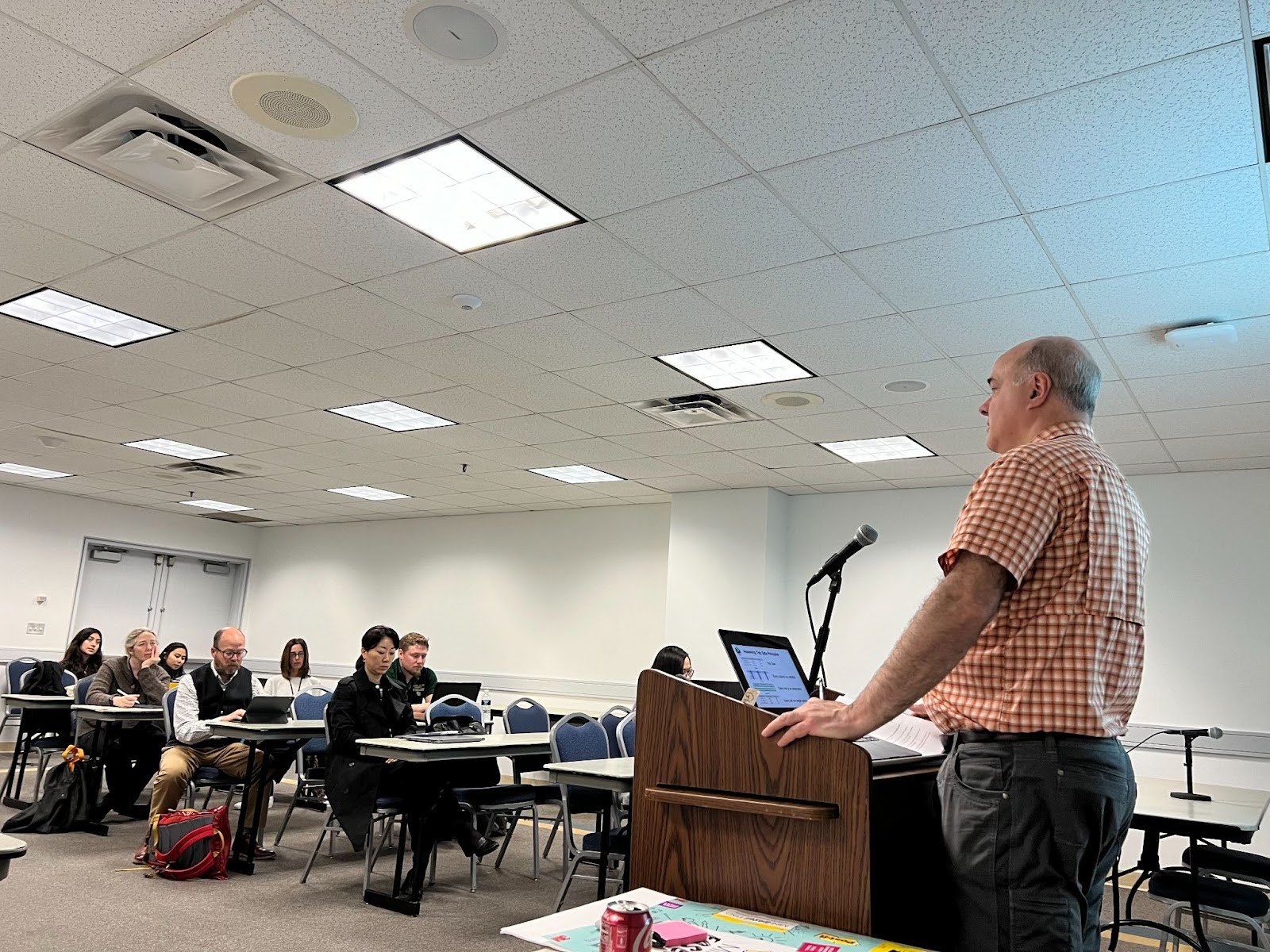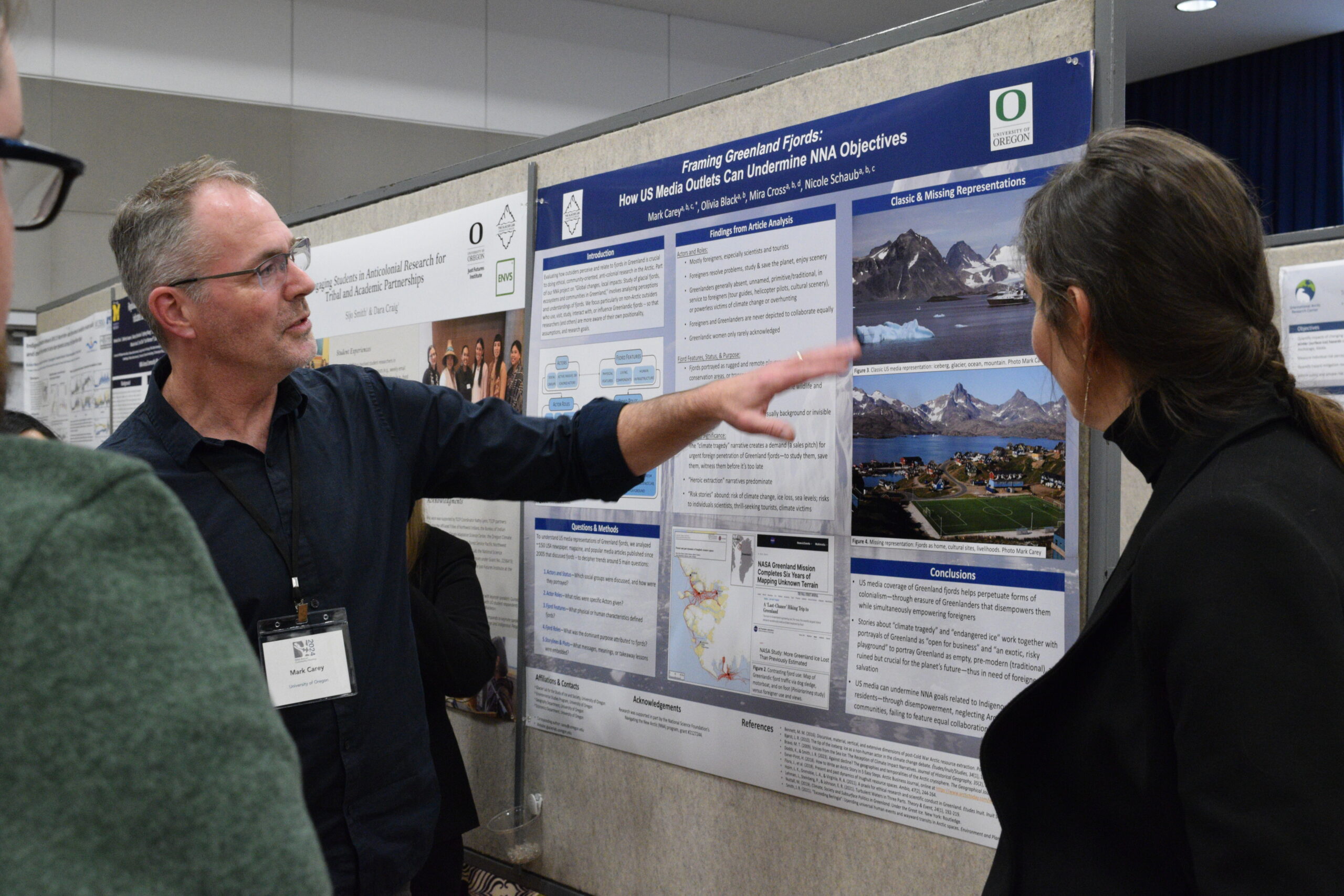About the Project
The National Science Foundation announced the 10 Big Ideas for Future NSF Investments in 2016, a strategic set of long-term research priorities aimed at catalyzing bold advances in science and engineering. Among them was the Navigating the New Arctic (NNA) program, an initiative designed to tackle one of the most urgent and complex challenges of our time: understanding and responding to rapid environmental and societal transformations in the Arctic. As the region experiences rapid change, warming at nearly four times the global average, Arctic research offers unprecedented scientific opportunities to explore critical risks to ecosystems, communities, and infrastructure around the world.

The NNA-CO organized a Congressional briefing in 2024 that featured NNA researchers speaking about advancing community-based research and knowledge co-production in the Arctic.
The NNA program represents a new paradigm in Arctic research. By fostering convergence across disciplines, from the social and natural sciences to engineering, environmental sciences, and computing, NNA supports integrated research that explores the intricate relationships between natural environments and human systems. From melting sea ice and shifting ecosystems to the lived experiences of Arctic communities, the questions NNA seeks to answer are as interconnected as the region itself. Through a range of grant tracks, including Incubator, Research, and Collaboratory Grants, the program invited innovative and collaborative approaches to understanding Arctic change and its cascading effects.
Key Themes Driving the NNA Program
Convergence at Its Core
At the heart of NNA lies convergence research, which brings together disciplines including the social sciences, engineering, environmental studies, computing, and the natural sciences to address Arctic change from a holistic perspective. Whether addressing melting permafrost, shifting ecosystems, or infrastructure resilience, NNA projects cross disciplinary boundaries to capture the interconnected nature of challenges and solutions in the region.
Community Engagement and Knowledge Co-Production

The 2024 NNA Annual Community Meeting featured an art exhibition that showcased the intersections of science and art in Arctic research.
The program emphasizes co-creation, collaboration, and deep partnership with Indigenous communities, and also engages with local communities throughout the Arctic. Through culturally-responsive research design, NNA projects foster mutual learning and leverage traditional knowledge alongside Western scientific methods to ensure outcomes that are both locally grounded and globally relevant.
To support this model of ethical and inclusive research, the NNA Community Office (NNA-CO) serves as a hub for coordination, collaboration, and capacity building across the NNA network. The NNA-CO provides tools, guidance, and resources that help research teams co-design projects with Arctic communities, ensure culturally appropriate practices, and foster long-term relationships between scientists and Arctic residents. The Community Office also strives to amplify Indigenous voices throughout their many convenings, including the NNA Annual Meeting, the Learn & Connect Series, and by elevating the work of Indigenous partners and organizations.
Education, Outreach, and Capacity Building
The NNA initiative goes beyond research by actively supporting the next generation of Arctic scholars and community leaders. Several awards support formal and informal education, workforce development, and inclusive engagement strategies that expand awareness of Arctic change.
Open Science and Data Sovereignty
NNA supports open science by encouraging researchers to share data, methods, and results in accessible and transparent ways. Most NNA-funded projects are required to submit their data to the Arctic Data Center, ensuring long-term preservation and broad access for the research community and public.
At the same time, NNA acknowledges the importance of data sovereignty. Not all data, especially when it involves cultural knowledge or sensitive information, should be openly shared. The NNA-CO helps researchers navigate this balance, offering resources to support ethical, respectful data practices that align with the CARE (collective benefit, authority to control, responsibility, ethics) Principles.
Program Spotlights
- Rapid Arctic change and its implications for fisheries and fishing communities of the western North Atlantic (Award #2220567)
- This project studies how rapid Arctic warming affects ocean circulation and, in turn, influences the American lobster fishery in the Northwest Atlantic. Researchers are developing coupled physical and ecological models to predict changes in lobster distribution and productivity, alongside bio-economic models to assess the industry’s resilience. By building a cross-sector NNA Lobster Network, the project supports collaboration and data sharing to inform climate adaptation strategies for fisheries and coastal communities.
- Developing capacity for planning and adapting to riverbank erosion and its consequences in the Yukon River Basin (Award #2127443)
- This project examines how Arctic warming is accelerating riverbank erosion in Alaska’s Yukon River basin, threatening water quality, ecosystems, and community infrastructure. Researchers are using field data and modeling to study how thawing permafrost releases contaminants like mercury and pathogens into rivers. Partnering with Indigenous communities, the team will co-develop Erosion Action Plans to support climate adaptation and resilience.
- Socio-ecological considerations for sustainAble Fuel treatments to Reduce wildfire Risk (SAFRR) (Award #2127283)
- This project evaluates how fuel treatments, such as thinning and prescribed burns, can reduce wildfire risk in boreal forests of Alaska and western Canada. Working with land managers, Indigenous groups, and communities, the team assesses the ecological impacts, costs, and public acceptance of these strategies. The goal is to develop an integrated, community-informed framework to guide more effective and socially acceptable wildfire risk reduction.
- Global changes, local impacts: Study of glacial fjords, ecosystems and communities in Greenland (Award #2127241)
- This project investigates how climate change and human activities are impacting Greenland’s glacial fjords—ecosystems vital to both marine life and nearby Arctic communities. An interdisciplinary team is studying two fjords to understand the interactions between retreating glaciers, ocean conditions, ecosystems, and local livelihoods. Through fieldwork, modeling, and collaboration with Greenlandic partners, the project aims to inform adaptive strategies for sustaining fjord systems and share findings with policymakers, communities, and the public.
Building Community Through Annual Meetings

Matt Jones presenting on the Permafrost Discovery Gateway and Arctic Data Center at 2024 NNA Annual Meeting in Washington, D.C. PC: Angie Garcia.
One of the key strengths of the NNA program lies in its ability to bring together a dedicated community each year through its annual meetings. These gatherings serve as more than just conferences—they are vibrant hubs where NNA researchers, policymakers, Indigenous community and organization representatives, educators, and research partners converge to share knowledge, forge connections, and collaborate on addressing the rapidly evolving challenges of the Arctic region. The Arctic Data Center (ADC) team has been lucky to attend and provide hands-on data science trainings during many of these meetings.

Matt Jones explaining to researchers how to submit data to the Arctic Data Center during workshop. PC: Angie Garcia.
In 2024, ADC Director Matt Jones and Community Engagement and Outreach Coordinator Angie Garcia hosted two data science training sessions at the NNA Annual Meeting in Washington D.C. which focused on educating researchers on what to consider when submitting data to the ADC. Both sessions helped about 35 researchers understand different unique factors to consider when handling data (regardless of size). It also gave our team an opportunity to receive feedback from attendees and discuss future improvements the repository to consider for the future. We have held other sessions in partnership with the NNA community, see our 2022 Open Science: Best Practices, Data Sovereignty and Co-production learning materials for more.

The 2024 NNA Annual Community Meeting featured around 40 poster presentations as well as an art exhibition.
NNA annual meetings foster an inclusive environment that encourages open dialogue and cross-disciplinary engagement. Participants not only present cutting-edge scientific research but also engage in meaningful conversations about the social, cultural, and environmental impacts of Arctic change. This dynamic interaction helps build trust and understanding across different sectors and communities, ensuring that the program’s initiatives are informed by a broad spectrum of perspectives. Through these gatherings, Navigating the New Arctic has cultivated a resilient and supportive community committed to advancing knowledge and stewardship of the Arctic’s unique and fragile environment.
The NNA-CO recently announced that the next annual meeting will be held in Fairbanks, AK from September 15–17, 2026. Find information on their upcoming events here.
Looking Ahead: The Legacy of NNA
As the Navigating the New Arctic program begins to sunset, its lasting impact on Arctic research and community engagement is evident. The strong relationships, knowledge, and collaborative spirit it fosters will continue to influence Arctic research for years to come. Through its unique platform, NNA has brought together researchers, Indigenous community and organization representatives, policymakers, educators, and Arctic community members, further building trust and a shared understanding around the challenges and opportunities of a changing Arctic.
The knowledge generated through NNA’s interdisciplinary research has also established a vital baseline for future Arctic studies and decision-making, informing policies and practices aimed at sustainable adaptation. Equally important, the program’s emphasis on inclusivity and capacity building has empowered a new generation of Arctic scholars and leaders who will carry forward the mission of thoughtful stewardship. Though NNA’s chapter will soon be sunsetting, its contributions have set the stage for ongoing innovation and resilience in Arctic science and communities, ensuring that its influence will be felt well into the future.
Written by Nicole Greco and Angie Garcia
Community Engagement and Outreach Coordinators
